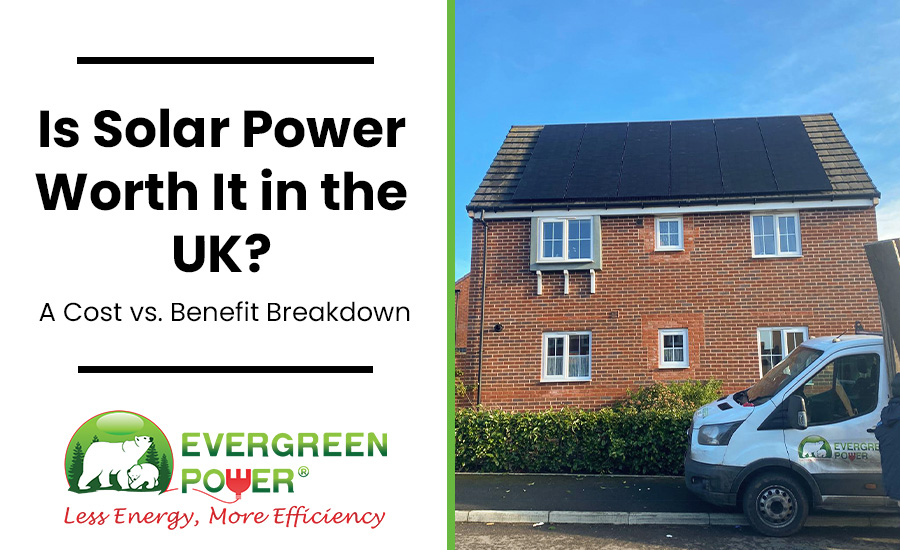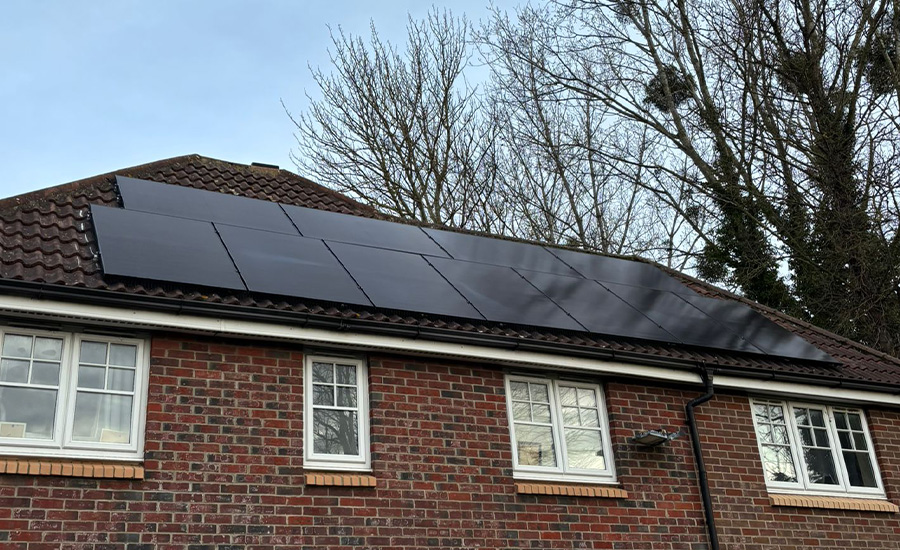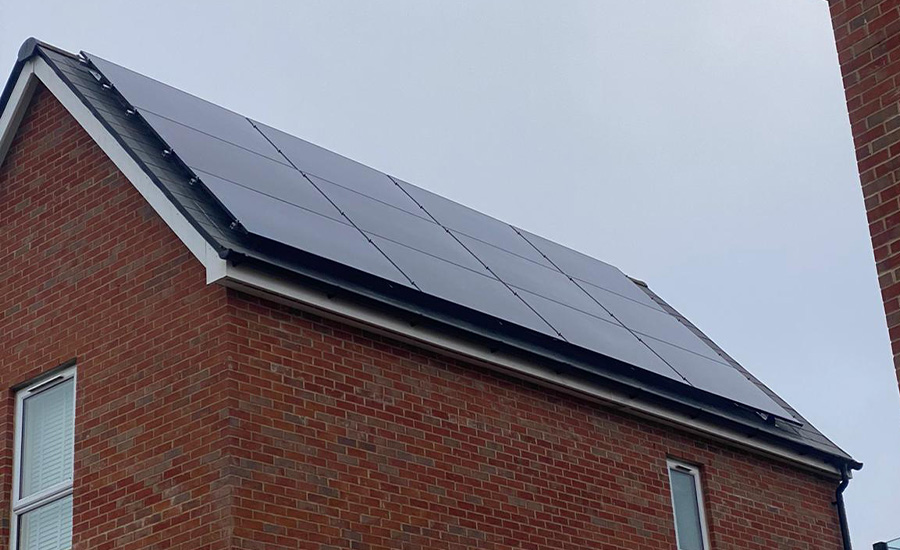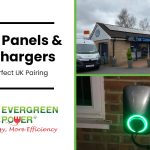
Introduction to Solar Power in the UK
The adoption of solar power in the UK has been steadily increasing in recent years as more homeowners and businesses recognize the long-term benefits of this renewable energy source. Despite the country’s famously cloudy weather, advancements in solar panel technology have made it a viable and attractive option for those seeking to reduce their carbon footprint and energy costs.
Evergreen Power UK is at the forefront of this solar revolution, offering expert installation services and cutting-edge solar solutions. With years of experience and a team of highly trained professionals, Evergreen Power UK has established itself as a trusted authority in the solar energy sector. Their commitment to quality workmanship and customer satisfaction has earned them a reputation for excellence, making them the go-to choice for homeowners and businesses seeking reliable and efficient solar power systems.
How Solar Panels and Batteries Work

Solar panels are composed of photovoltaic cells that convert sunlight into direct current (DC) electricity. When sunlight hits the solar cells, it knocks electrons loose from their atoms, allowing the electrons to flow through the material and generate an electrical current. This process is known as the photovoltaic effect.
In the solar panels uk are typically installed on rooftops or in open spaces, facing south to maximize exposure to sunlight. The amount of electricity generated by solar panels depends on various factors, including the size of the system, the efficiency of the panels, and the amount of sunlight available.
Solar batteries, also known as energy storage systems, are used in conjunction with solar panels to store excess electricity generated during the day for use at night or on cloudy days. These batteries are typically made of lithium-ion or lead-acid and can be charged and discharged multiple times, providing a reliable source of backup power.
The UK has significant potential for solar energy generation due to its geographical location and climate. While the country may not have the same level of sunlight as some tropical regions, it still receives enough sunlight to make solar power a viable option for many households and businesses. According to the UK government’s estimates, the country has the potential to generate up to 25% of its electricity from solar power by 2030.
Government Incentives for Solar Power in the UK

The UK government has implemented various incentives and policies to promote the adoption of solar power and other renewable energy sources. One of the primary incentives is the Smart Export Guarantee (SEG), which requires energy suppliers to pay homeowners and businesses for the surplus electricity they export back to the grid from their solar panels.
Furthermore, the UK has set ambitious targets for reducing greenhouse gas emissions and increasing the share of renewable energy in its energy mix. The government’s Clean Growth Strategy aims to achieve a 57% reduction in emissions by 2030 compared to 1990 levels, and to ensure that 85% of the UK’s electricity comes from low-carbon sources by 2050.
To support these goals, the government has introduced various policies and regulations, such as the Feed-in Tariff (FiT) scheme, which provided payments to households and businesses for generating their own renewable electricity. Although the FiT scheme closed to new applicants in 2019, existing installations continue to receive payments until their contracts expire. Another incentive government brought in was introducing 0% VAT on solar panels and batteries installation.
Overall, the UK government’s incentives and policies have played a crucial role in making solar power more accessible and financially viable for homeowners and businesses, contributing to the growth of the solar energy sector in the country.
Initial Investment Costs for Solar Panels and Batteries
The initial investment required for a solar panel system is often the biggest hurdle for homeowners considering a switch to solar power. However, it’s essential to understand that this upfront cost is an investment that will pay off over time through reduced energy bills and various financial incentives.
The cost of a solar panel system can vary significantly depending on several factors, such as the size of the system, the type of panels, and the complexity of the installation. On average, a typical residential solar panel system in the UK can cost anywhere between £7,000 and £10,000 for a 3-4 kW system, which is suitable for a medium-sized home.
In addition to the solar panels themselves, you’ll need to factor in the cost of an AC Couple Inverter Charger, which converts the direct current (DC) electricity generated by the panels into alternating current (AC) for use in your home. Inverters can range from £500 to £1,500, depending on the size and quality.
If you plan to store excess energy generated during the day for use at night or during periods of low sunlight, you’ll also need to invest in a solar battery system. These batteries can add an additional £2,000 to £6,000 to the overall cost, depending on the capacity and quality of the batteries.
While the initial investment may seem substantial, there are various financing options available to make solar power more accessible. Many solar companies offer payment plans that allow you to spread the cost over several years, making the monthly payments more manageable.
Additionally, the UK government offers several incentives and schemes to encourage the adoption of renewable energy sources, such as the Smart Export Guarantee (SEG). These programs provide homeowners with financial rewards for generating and exporting excess energy back to the grid, further offsetting the initial investment cost.
By understanding the upfront costs and exploring the available financing options and government incentives, you can make an informed decision about whether Flat Roof Solar Panels Installation uk is the right choice for your home or business.
Potential Savings on Energy Bills

Installing solar panels and batteries can lead to substantial savings on your energy bills over time. The exact amount you can save depends on several factors, including your energy consumption habits, the size and efficiency of your solar system, and the local electricity rates in your area.
One of the primary benefits of solar power is that it allows you to generate your own electricity, reducing your reliance on the grid and the associated costs. During daylight hours, your solar panels will produce electricity, which can be used to power your home or business. Any excess energy generated can be stored in your solar batteries for use during the evening or on cloudy days.
According to industry estimates, a typical residential solar panel system in the UK can generate around 3,800 kilowatt-hours (kWh) of electricity per year. With the current average electricity rate of approximately 25 to 28 pence per kWh, this translates to an annual savings of around £800 to £1,000 on your electricity bills.
However, it’s important to note that the potential savings can vary significantly based on your specific energy consumption patterns. Households with higher energy demands, such as those with electric vehicles or larger homes, may see even greater savings by investing in a larger solar system.
Additionally, the orientation and positioning of your solar panels can impact their efficiency and energy production. Panels that are optimally positioned to receive maximum sunlight exposure will generate more electricity, leading to higher savings.
Another factor to consider is the availability of government incentives and feed-in tariffs, which can further increase the financial benefits of solar power. In the UK, the Smart Export Guarantee (SEG) scheme allows homeowners and businesses to receive payments from their energy suppliers for any excess electricity they export back to the grid.
While the upfront costs of installing solar panels and batteries can be substantial, the long-term savings on energy bills can offset this investment over time. Many homeowners find that their solar systems pay for themselves within 5 to 8 years, after which they continue to enjoy free electricity and substantial savings on their energy costs.
Environmental Benefits of Solar Power
Solar power is a clean and renewable energy source that can significantly reduce your carbon footprint and contribute to a more sustainable future. By harnessing the power of the sun, solar panels generate electricity without producing any harmful greenhouse gas emissions or pollutants. This makes solar energy an environmentally friendly alternative to traditional fossil fuel-based energy sources, such as coal and natural gas.
Transitioning to solar power can play a crucial role in mitigating the effects of climate change. The burning of fossil fuels for electricity generation is a major contributor to global warming and air pollution. By reducing your reliance on these non-renewable sources, you can actively participate in the effort to combat climate change and promote a healthier environment for future generations.
Furthermore, solar power is a sustainable energy solution that does not deplete natural resources. Unlike fossil fuels, which are finite and will eventually run out, the sun’s energy is an abundant and inexhaustible source. By investing in solar power, you are contributing to a more sustainable energy future and reducing the demand for non-renewable resources.
In addition to its environmental benefits, solar power can also contribute to the development of local communities. The installation and maintenance of solar systems create job opportunities in the renewable energy sector, fostering economic growth and supporting the transition towards a greener economy.
Overall, embracing solar power is a responsible and forward-thinking choice that not only reduces your carbon footprint but also promotes sustainability and environmental stewardship for generations to come.
Financial Benefits of Solar Power

Investing in solar power offers significant long-term financial benefits for homeowners in the UK. While the initial costs may seem substantial, the savings generated over the lifespan of a solar system can far outweigh the upfront investment.
One of the primary financial advantages of solar power is the potential for substantial savings on energy bills. By generating your own renewable electricity, you can reduce your reliance on the grid and the associated utility costs. how much do solar panels UK cost 2025? – Depending on the size of your solar installation and your energy consumption patterns, you could potentially save thousands of pounds annually on electricity expenses.
In addition to the direct savings on energy bills, solar power installations can also increase the value of your property. Homes and commercial buildings equipped with solar panels are often perceived as more desirable and environmentally friendly, which can translate into higher resale values. According to recent studies, properties with solar panels can command a premium of up to 14% compared to similar non-solar homes in the UK market.
Furthermore, the long-term financial benefits of solar power extend beyond just energy savings and property value appreciation. Many solar panel systems come with performance guarantees, ensuring reliable energy production for decades. This means that your investment in solar power will continue to generate returns well into the future, providing a stable source of clean energy.
It’s important to note that the financial benefits of solar power can vary depending on factors such as location, system size, and energy consumption patterns. However, with the declining costs of solar technology and the increasing availability of financing options, investing in solar power has become more accessible and economically viable for a wider range of UK homeowners and businesses.
Challenges and Considerations
While solar power offers numerous benefits, it’s essential to consider potential challenges and carefully evaluate your specific situation before investing. One of the primary consideration is the available space for installation solar panels UK. Rooftop installations are the most common option for residential properties, but the size and orientation of the roof can impact the number of panels that can be installed and their overall efficiency. Larger installations may require additional space, such as Ground Mount Solar Panels Installation uk, which can further increase costs and potentially face planning permission challenges.
When choosing a solar system, it’s crucial to consider your energy consumption patterns and future needs. Factors like the size of your property, the number of occupants, and your lifestyle habits will determine the appropriate system size and battery storage capacity required to meet your energy demands effectively. Evergreen Power UK‘s experts can conduct a detailed assessment and provide tailored recommendations to ensure you select the right solar solution for your specific requirements.
Additionally, it’s important to consider the aesthetics and potential impact on your property’s value. While solar panels can enhance the appeal of a property for environmentally conscious buyers, some homeowners may have concerns about the visual impact on their home’s appearance. Evergreen Power UK offers a range of panel designs and installation options to minimize any potential aesthetic issues and ensure a seamless integration with your property.
Testimonials
“Evergreen Power UK made the process of going solar incredibly straightforward. Their customer service is top-notch, and they truly care about finding the best solution for each client.” – Sarah L., Homeowner in London
“From the initial consultation to the final installation, the team at Evergreen Power UK was a pleasure to work with. They truly went above and beyond to ensure our complete satisfaction.” – Emily R., Homeowner in Derby
Conclusion
In conclusion, the cost versus benefit analysis of solar power in the UK demonstrates that it is a worthwhile investment for both homeowners and businesses. While the initial costs may seem substantial, the long-term financial and environmental benefits outweigh the upfront expenditure. By harnessing the power of the sun, you can significantly reduce your energy bills, increase your property value, and contribute to a more sustainable future.
Evergreen Power UK is a trusted leader in the solar energy industry, with years of experience and a team of certified professionals dedicated to providing exceptional service. Our expertise ensures that your cost of installation solar panels uk is tailored to your specific needs, maximizing efficiency and delivering optimal results.
Take the first step towards a greener, more cost-effective energy solution. Contact Evergreen Power UK today to schedule a free consultation and receive a personalized quote. Our knowledgeable representatives will guide you through the process, answering any questions you may have and helping you make an informed decision and are solar panels worth it uk
Embrace the power of the sun and join the growing movement towards renewable energy. Contact Evergreen Power UK at 020 3793 7323 or email at info@evergreenpoweruk.com and let us help you harness the potential of solar power for your home or business.
Written by: Kyler Walter

- Kyler Walter is a passionate advocate for renewable energy and sustainable living. As a leading voice at Evergreen Power UK, he specializes in solar energy solutions and has played a vital role in promoting innovative, eco-conscious technologies across the UK.
Latest entries
 EV ChargersApril 2, 2025Solar Panels and EV Chargers: The Perfect UK Pairing
EV ChargersApril 2, 2025Solar Panels and EV Chargers: The Perfect UK Pairing SolarMarch 17, 2025Eco-Friendly Homes: How Solar Panels Reduce Your Carbon Footprint
SolarMarch 17, 2025Eco-Friendly Homes: How Solar Panels Reduce Your Carbon Footprint Solar BatteriesMarch 11, 2025Solar Batteries Explained: How They Work and Why You Need One in the UK
Solar BatteriesMarch 11, 2025Solar Batteries Explained: How They Work and Why You Need One in the UK newsFebruary 26, 2025The Benefits of Solar Panels in the UK: Are They Worth the Investment?
newsFebruary 26, 2025The Benefits of Solar Panels in the UK: Are They Worth the Investment?


